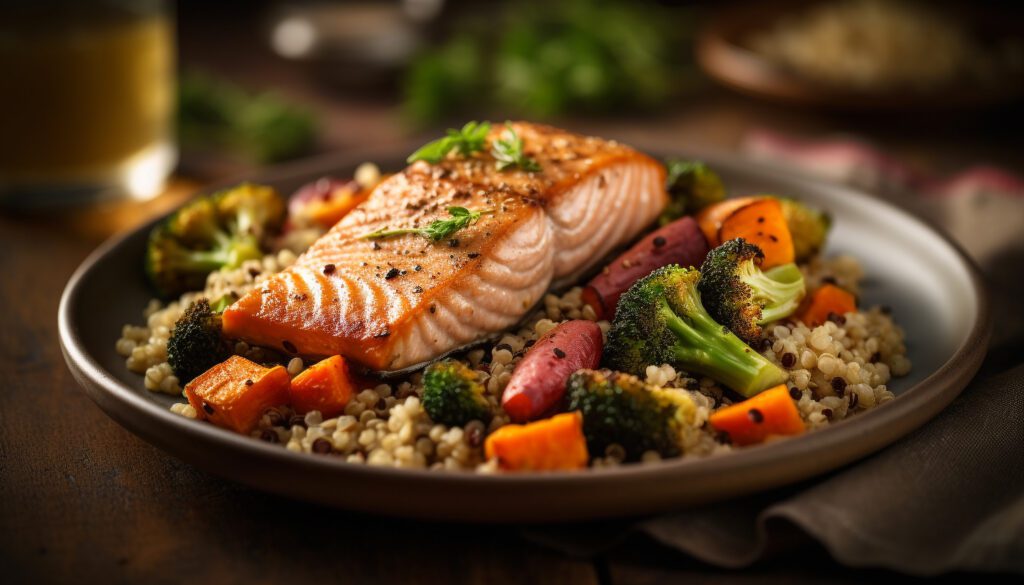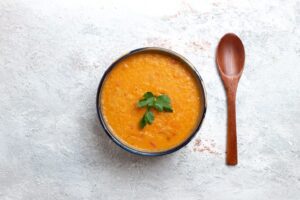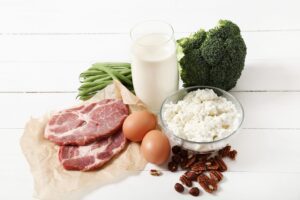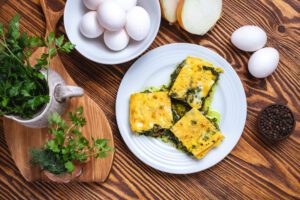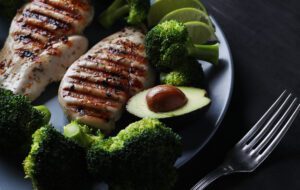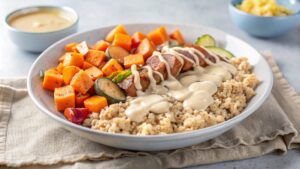Brain cancer is a life-threatening condition that deteriorates the brain’s health as well as that of the body. The proper treatment of this disease involves surgery as well as chemotherapy and radiation therapy. But do you know that a proper brain cancer diet and nutrition plan can also assist in a swift and effective recovery?
Let us now talk about the brain cancer diet and nutrition, how a proper diet relieves the effects of disease and improves health status, and what can be incorporated into the daily diet.
Table of Contents
Brain cancer diet and nutrition challenges
What is brain cancer?
Brain cancer occurs when there is abnormal growth in brain cells that affects healthy cells and brain function. It presents certain difficulties as it is necessary to elaborate an efficient brain cancer diet and nutrition that takes into account the dietary requirements of the patients.
1. Primary Tumors: which start in the brain.
2. Secondary Tumors: which reach the brain from other body parts.
Symptoms of Brain Cancer
- Headaches that get worse over time.
- Memory loss or concentration issues.
- Nausea and vomiting.
- Seizures or loss of motor control.
Need for treatment and nutrition.
Treatments like chemotherapy and radiation weaken the body. The patient’s weight and energy level can also drop significantly. These treatments also affect the capacity to absorb nutrients. Therefore, a well-thought-out brain cancer diet and nutrition strategy is essential for maintaining strength and energy during recovery.
Role of Nutrition in Brain Cancer Recovery
Connection between Diet and Brain Health
Brain cancer treatment increases oxidative stress and inflammation. Here the role of nutrition becomes very important. Your diet:
- Reduces inflammation.
- Supports brain function and memory.
- Makes the immune system strong.
Nutrition Importance for Recovery
A balanced diet for brain cancer patients:
- Maintains energy levels.
- Helps repair tissues.
- Manages the side effects of treatment.
Best Foods to Include in a Brain Cancer Diet
A robust brain cancer diet and nutrition plan includes high-protein foods, antioxidants, and omega-3 fatty acids, which are critical for recovery. Foods like berries, fatty fish, and green tea are essential components of such a plan.
1. High-Protein Foods
Protein repairs damaged body tissues and maintains energy levels. High-protein foods:
- Lean meats (chicken, turkey)
- Eggs
- Legumes (lentils, beans)
- Tofu and paneer
- Dairy products (milk, yogurt)
How to include?
Take boiled eggs or Greek yogurt for breakfast. Have grilled chicken or a combination of dal and vegetables for lunch.
2. Antioxidant-rich foods
Antioxidants neutralize free radicals that promote the growth of cancer cells. Best sources:
- Berries (blueberries, strawberries)
- Spinach and broccoli
- Green tea
- Nuts and seeds
How to include them?
Add berries to smoothies. Keep green tea and nuts as an option for snacks.
3. Omega-3 Fatty Acids
These fatty acids reduce inflammation and improve the cognitive function of the brain. Best sources:
- Fatty fish (salmon, tuna)
- Walnuts and chia seeds
- Flaxseed oil
How to include?
Include fatty fish at least twice a week. Add chia seeds with oatmeal for breakfast.
4. Hydration
It is important to keep the body hydrated because dehydration can worsen weakness and fatigue. Best options:
- Plain water (8-10 glasses daily)
- Coconut water
- Herbal teas
- Fresh fruit juices (without sugar)
How to include?
Start your day with a glass of water or coconut water and drink herbal tea after every meal.
5. Vitamins and Minerals
Some vitamins and minerals are very important for brain cancer recovery:
- Vitamin C (Oranges, guava, kiwis)
- Vitamin D (Fortified milk and sunlight)
- Zinc (Pumpkin seeds, nuts)
- Magnesium (Bananas, avocados)
How to include them?
Take fruits as snacks and keep avocado salad as an option for dinner.
Foods to Avoid During Recovery
A proper brain cancer diet and nutrition plan also involves avoiding processed foods, sugary items, and alcohol, which can hinder recovery by increasing inflammation and weakening the immune system.
1. Processed Foods
These contain unhealthy fats and preservatives that can increase inflammation.
Avoid: Chips, fast food, and candied items.
2. Sugary Foods
High sugar can help cancer cells grow.
Avoid: Sodas, sweets, and pastries.
3. Alcohol and Caffeine
This can cause dehydration and make side effects more severe.
Avoid: beer, coffee, and energy drinks.
How to Make a Balanced Diet?
A well-designed brain cancer diet and nutrition plan ensures that meals are balanced, including the right proportions of proteins, antioxidants, and hydration.

Daily Meal Plan Example
- Breakfast: Oatmeal + berries + walnuts
- Snack: Green tea + almonds
- Lunch: Grilled salmon + quinoa + steamed broccoli
- Snack: Fresh fruit salad
- Dinner: Tofu stir-fry + brown rice + spinach
Tips for Maintaining a Nutritious Diet
- Plan your weekly meals.
- Avoid processed and ready-to-eat foods.
- Consult a professional dietitian.
Case Study: Journey of a Patient
Mark, a 40-year-old brain cancer patient, adopted a tailored brain cancer diet and nutrition plan after chemotherapy. Within three months:
- His energy levels improved.
- Side effects of treatment decreased.
- His overall health saw significant improvement.
Practical Tips and Actionable Steps
1. Take guidance from a dietitian
A customized diet will fulfill your specific needs.
2. Maintain a food journal
Record your daily diet and your body’s response.
3. Focus on whole foods
Use natural and fresh foods while avoiding processed foods.
4. Prep meals
Prepare weekly meals a day in advance.
5. Include physical activity
Light exercise or yoga supports the recovery process.
Conclusion
It cannot be disputed that battling and treating a brain tumor is extremely difficult, however, following a brain cancer diet and nutrition guidelines in an appropriate manner can enhance recovery substantially. By incorporating sufficient proteins, vitamins, and omega-3 fatty acids into your diet, you can not only recuperate faster but also enhance your overall health.
FAQs
Which nutrient is most important for brain cancer recovery?
Protein and antioxidants are the most important.
Is it safe to take supplements?
Yes, but do not take any supplements without the guidance of a doctor.
What effect does hydration have on recovery?
Hydration helps flush out toxins and reduce fatigue.
What are the best superfoods for the brain?
Blueberries, walnuts, and salmon are best for brain health.
Are dairy products safe?
Yes, but avoid them if you are lactose intolerant.

